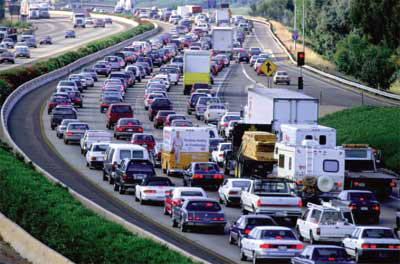With gas prices above $4 a gallon (at least this week), we've entered a familiar cycle.
Man-on-the-street interviews feature wailing and moaning about how politicians "should do something" about gas prices. Drivers start to combine their trips, and make sure to use their most fuel-efficient vehicle.
And, as carmakers know, car buyers start to opt for more fuel-efficient models with better gas mileage ratings. Then gas prices fall, and we revert to our old ways.
But what if gas prices stayed permanently higher? Might there be some hidden benefits?
According to a new University of Illinois study, the more we drive, the fatter we get. In fact, data from 1985 to 2007 shows a remarkable 99-percent correlation between increases in miles driven and increases in obesity.
So the more gas costs, the fewer miles we drive (that's proven, statistically). Over time, then, perhaps that could cause us to start to lose weight?

Kibera slums outside Nairobi, Kenya, by Flickr user Chrissy Olson
Well, maybe. But a lot of it has to do with where and how we live. The U.S. "obesity epidemic" may well be due to our high degree of suburban sprawl, with the miles we drive just a byproduct of our housing choices.
Those bucolic subdivisions, with shiny new McMansions sitting on 2-acre plots along winding cul-de-sacs with nary a sidewalk in site, and the nearest quart of milk a 5-mile drive away? Could they be making us fat?
D'ya think?
Find me kids who ride their bikes several miles each day after school, just for fun, or fathers who walk 1 or 2 miles to work every day. They're pretty much a relic of bygone days for most Americans.
Even better, we're exporting The American Way of Obesity to other countries too. Newly-minted car owners in developing countries like China and India get fatter too, the study found. Oh, hurray.
We already know that our collective obesity requires more fuel to haul around, meaning it's a vicious cycle: Using cars makes us fatter, which requires more gas, which we complain more about, while doing nothing about the cause.

Traffic Jam
So it won't be until we start to move away from sprawl-centric life patterns that require cars to do anything at all that things will change. That's when those remote suburbs turn into slums, because the commutes to where the jobs are cost too much.
But with average gas mileage potentially set to rise as high as 62 mpg, that may not happen.
In other words, our future cars will get better gas mileage--and plug-in electric cars won't use gasoline at all--so we'll be removing any incentive to cut down on miles traveled.
Which means that, in the long run, the answer to our title question may be "no." That is, we'll make cars that keep the cost of fuel manageable, so there will be little incentive to drive less.
Think about that the next time you drive 12 miles each way to the gym, to try to lose some of that excess weight.
[Fast Company via MotorAuthority]
+++++++++++













